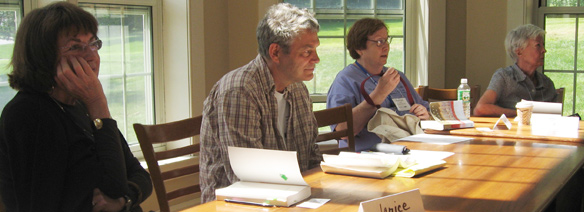About Great Books at Colby

Great Books at Colby is our annual week of lively discussion at Colby College. We are a community of people who enjoy reading and discussing good books.
Have you ever closed a book after reading the last page and wished you could share your thoughts with someone?
Colby offers an opportunity to collaborate in discovering insights rarely achieved just reading alone.
Located on a beautiful campus, the college has a great library, the admission free Colby Museum of Art,
a bookstore, tennis courts and first-class athletic facilities with a swimming pool, as well as waterfront property at a nearby lake
open to Great Books participants.
It offers an inexpensive but classy vacation where readers who love to think and talk about the world’s great literary
works can derive pleasure from spending time with others who share that enthusiasm. For two hours each day, readers discuss their
understanding of thought-provoking classics through the Great Books Foundation’s Shared Inquiry Method. Join us in examining
how these great writers view this process.
Registration covers books and discussions, as well as lectures, films, group social activities,
use of the athletic facilities and tennis courts, and a real Maine lobster bake.
On campus registration includes a single or double dormitory room (six nights: Sunday through Friday) and all meals.
You can stay over Saturday night either before the week or after the week for an additional charge.
Either night allows you to attend the Atlantic Music Festival’s outstanding free classical music concert.
Commuters participate in all activities, but live on their own, off-campus, and receive lunch each day and the Friday night lobster bake.
>>Back to Top
The Books
Adult Selections
July 21 - July 27, 2023
Great Books at Colby:
The Essential Perspective
July 21 - July 27, 2023
Great Books at Colby: The Essential Perspective
Note: shipped selections may not match images.
**********
**********
Monday: At the Existential Café, Sarah Bakewell

Sarah Blakewell’s engaging social history, At the Existentialist Café (2016), serves as our foundation. As Blakewell explains,
“existentialists concern themselves with individual, concrete human existence,” and individual existence is “whatever I choose to make of myself at every moment.”
She highlights biographical data and ideas of the most prominent existential theorists. Essentially, At the Existentialist Café engages the reader with fundamental questions as to how
people think about themselves and their relations with others.
Tuesday: The Stranger, Albert Camus

The novella, The Stranger (1946), by Albert Camus, is considered one of the most compelling, disquieting and haunting texts involving personal
alienation of the twentieth century. Camus’ compact style presents a stark and startling insight into the modern world.
The Stranger is essentially a novel of ideas which offers a concrete case where the claim that ideas have consequences can be succinctly
scrutinized and studied. Camus boldly portrays the existential concept of absurdity, an experience Sartre described as “discrepancy, divorce, and disorientation.”
Wednesday: Catch-22, Joseph Heller

The dazzling tragicomic anti-war novel, Catch-22 (1961), by Joseph Heller, himself a bombardier pilot in WW II, is a biting, satirical
denunciation of war and those in charge of the military. In this novel, the reader encounters not only the grim reality of war, but a whole other universe of
fabulous fabrications, fantasy, farce and folly, where the fact-checking of falsehoods constantly falls short. Lurking behind Heller’s tour-de-force absurdist
comedy is the view of existentialists that at the heart of the universe there is only a stark, indifferent emptiness.
Thursday: The Unbearable Lightness of Being, Milan Kundera

The philosophical postmodern novel, The Unbearable Lightness of Being (1984), by Milan Kundera is framed by the demoralizing Prague Spring
of 1968 in Czechoslovakia. The psychology of the characters and their relationships with one another become weighed down by secretive surveillance of the Soviet’s
spy setup. Kundera addresses the question of whether happiness and love can coexist without political freedom and under a pall of disillusionment.
Friday: An Artist of the Floating World, Kazo_Ishiguro

The novel, An Artist of the Floating World (1986), by Kazuo Ishiguro is “a sensitive examination of the turmoil in postwar Japan, a time when
certainties were overturned, gender politics shifted, the hierarchy of the generations seemed to topple, and even the geography of cities changed.
All this is made more poignant when seen through the eyes of a man who is rejected by the future, and who chooses to reject his own past.”
Ishiguro’s artistic protagonist is forced to face his former passionately held beliefs and their consequences and thereby struggles with the tenet of
existentialism that we must always take full responsibility for all our actions.
Saturday: Love, Clarice Lispector
The imaginatively penetrating short story, Love (1952), by the highly acclaimed Ukrainian-born, Brazilian writer, Clarice Lispector, is suffused with profound, yet sublime, existential insights experienced by an everyday woman. A moment of compassionate empathy, vivid and unsettling, leads to a moment of psychological mal de mar and a peek behind the complacency of domestic life, thereby offering the possibility of coming face-to-face with one’s inner depth.
Saturday: Pigeon Feathers, John Updike
Our other dramatic coming-of-age short story, Pigeon Feathers (1956), by John Updike, poignantly portrays a youth struggling with faith and doubt, religion and science, who plummets into a panicky personal existential crisis. Updike craftily creates a situation that elegantly evinces how everyday reality, if approached and perceived with curiosity, an open mind, and reverence, may sometimes lead to enlightenment and a radical private revelation.
Shared Inquiry—Discussion Guidelines
In shared inquiry, participants discuss fundamental questions raised by the text and help one another assess answers. Participants come to a discussion with their own unique ways of viewing the selection, then build on that by sharing their ideas.
Discussion leaders provide direction and guidance by asking questions for which they genuinely do not know the answer. Questions are based on the text but the leader is not an expert. The group should not look to him or her for answers.
Four Principles of a Shared Inquiry Discussion:
- Only those who have read the selection may take part in discussion because participants who have not read the selection cannot support their opinions with evidence from the text, nor can they bring knowledge of the text to bear on the opinions of others.
- Discussion is restricted to the selection that everyone has read. This rule gives everyone an equal chance to contribute because it limits discussion to a selection familiar to all participants.
When the selection is the sole focus of discussion, everyone can determine whether facts are accurately recalled and opinions adequately supported. - Support for opinions should be found within the selection. Participants may introduce outside opinions only if they can restate the opinions in their own words and support the ideas with evidence from the selection.
This rule encourages participants to read carefully and think for themselves. - Leaders only ask questions—they do not answer them. Leaders help themselves and participants understand a selection by asking questions that prompt thoughtful inquiry.
The leader assists the group by asking follow-up questions—questions that encourage participants to clarify comments, support ideas with evidence from the reading, and comment on proposed interpretations.
Discussions will be richer and more productive if you remember to:
- Temper the urge to speak with the discipline to listen
- Substitute the impulse to teach with a passion to learn
- Hear what is said and listen for what is meant
- Marry your certainties with others’ possibilities
- Reserve judgment until you can claim understanding
>>Back to Top



